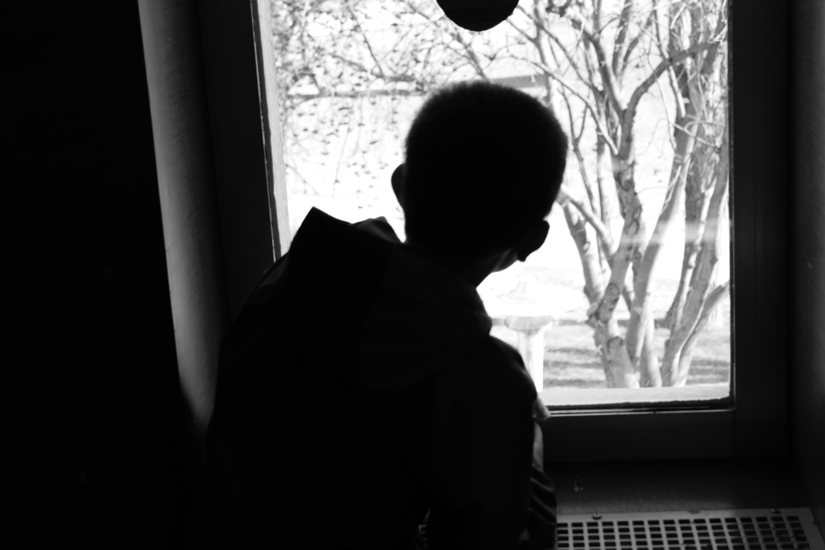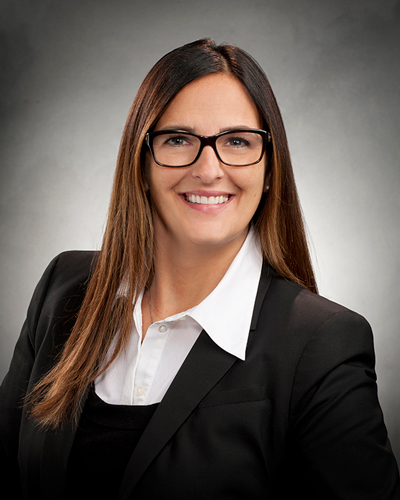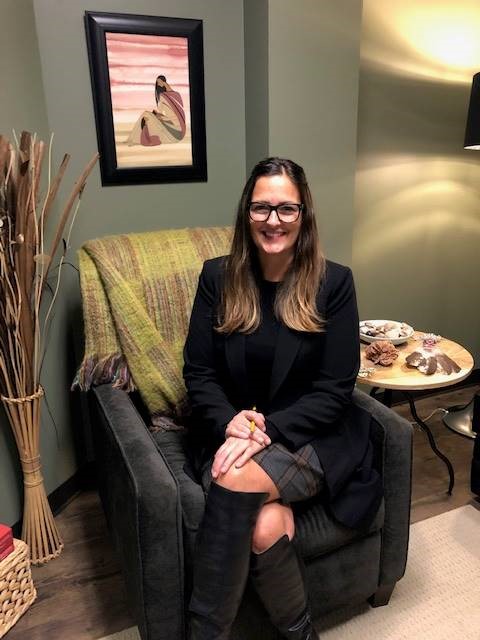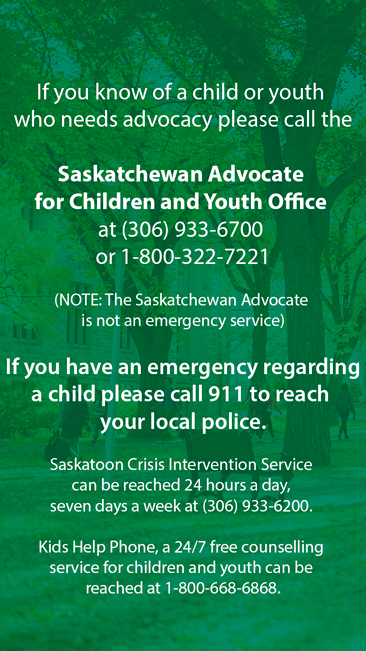
A life for a child
Saskatchewan Advocate for Children and Youth a role of a lifetime for Lisa Broda
By John GraingerWhen Lisa Broda (BA’96, MA’03, PhD’17) was a teenager, she could often be found volunteering at Saskatoon’s St. Paul’s Hospital maternity and pediatrics ward holding newborns or playing with toddlers.
So, it’s not surprising that she is now working on behalf of children as the Saskatchewan Advocate for Children and Youth. It’s just on a much larger scale these days.

Broda still cares for children as she did at St. Paul’s. But now, she cares for each and every single child in Saskatchewan as part of her role as Advocate, a position she has held since November, 2019.
“For me, I’ve always worked with children in some way over the course of my career,” says Broda.
“I probably didn’t realize at that time why I felt compelled to volunteer, and certainly wouldn’t have known at the time that this is the chair I’d be sitting in.”
The Advocate for Children and Youth is an independent officer of the Saskatchewan Legislative Assembly.
Broda’s office holds a legislated mandate to advocate for the rights, interests and well-being of the young people of this province. This role is to be a voice for young people and to uphold children’s right to services provided by any government, agency or publicly funded health entity within the province.
Broda’s office not only holds the government and entities that serve children to account, but also collaborates to support better outcomes for children through her office’s advocacy, investigation, research, and public education arms.
Broda always carried an innate sense of responsibility for children, something that is the essence of her role as the Advocate. This comes from her values and philosophy, both personally and professionally, to ensuring that young people have voice in matters that affect them and that their rights are upheld.
Even during her time as an undergrad at the University of Saskatchewan (USask), Broda was an active volunteer with youth organizations such as YMCA and the John Howard Society. Her current role is not just a vocation for Broda, per se, but just a pursuit of something she always strived to do in both her academic and government career.
“Working with children and youth has always been a passion for me. These young people are our current and future leaders, and are amazing in their own right. To be appointed the Saskatchewan Advocate for Children and Youth is such an honour. It’s a privilege to work on the behalf of, and in support of Saskatchewan children. It is also critical that our office can be a voice for all young people and to advocate for their rights, interests, and well-being.”
Fine-tuning a career path
Broda, who has five children of her own, first started her academic career with a focus on social and criminal justice, where she spent the bulk of her career before being appointed as the Advocate. Her career path came into focus for her once she started her graduate level work, all of which happened alongside of Broda building her career in government and community.

Amongst the many mentors who were integral in providing her support over the years, there were two particular faculty members who Broda says “influenced her and provided support in both her research and her doctorate work in later years.”
Dr. Carolyn Brooks (BA’88, MA’93, PhD’09), current department head in Sociology at USask, was one of the first to make an impression on Broda.
“We both had a lot in common in that both our children were young while we were doing our graduate work and we were both lecturers in the department,” said Broda.
Broda noted that Brook’s care, passion and discipline in her work influenced her own path.
“Dr. Brooks is someone I saw as an inspiration to me due to her creative teaching methods, her passion for the students, and her work overall.”
Another mentor who profoundly changed the way Broda embraced her career and her academic path was Dr. Patricia Monture-Angus (1958-2010). Monture-Angus who was an Indigenous scholar at the USask, influenced Broda into working toward a doctorate in the discipline.
“I had some ideas about the research I wanted to engage in and I had been talking with Dr. Monture-Angus about how to better understand restorative justice and reconciliation, which at the time was not well understood or fully embraced.
“Dr. Monture-Angus was very inspirational because she was so passionate about working hard for Indigenous people’s rights, and to change the narrative of how society viewed her people.”
Over time, Broda carried on with her chat with Monture-Angus about a direction with her education and recalls Monture-Angus being very blunt with her in how to do appropriate research with Indigenous communities.
"I received some very important guidance on doing culturally appropriate and sensitive research when engaging with Indigenous peoples."
‘You need to do this.’
“Dr. Monture-Angus said to me, ‘You need to do this, and here’s why. You’re a practising academic which means you can create important change in the community, and there aren’t many of those out there.’ ”
Broda, who remains a sessional lecturer at USask, believes Monture-Angus probably recognized a strength in her and perhaps knew where Broda may end up one day.
Monture-Angus, a Mohawk activist and scholar who passed away in 2010, was someone widely regarded as somewhat controversial in her advocacy for Indigenous people, but Broda thinks she was ahead of her time.
“She was a true champion and a passionate advocate for the rights of Indigenous people, and in a way, a bit unconventional at that time which was needed. There is still a lot of work to do, however, we now have some momentum with the Calls to Action from the Truth and Reconciliation Commission.”
Broda says she received sage advice early in her career. And its advice she tries hard to live by, even when dealing with government and other agencies as the Saskatchewan Advocate for Children and Youth.
“I was once told that its important to work hard to try an influence systemic change where you can by working collaboratively, respectfully and fairly first, rather than using your authority first. It’s influence over authority. Every single time. And I never forgot that. That’s so important. That has stuck with me my entire career.”
Making a difference
Broda was in the news during the summer months of 2020 when she sounded the alarm about the high number of deaths of children receiving services, or in the care of, the child welfare system. The number of deaths of Indigenous children and youth is also very concerning however, her office still needs to analyze if there are any specific trends identified, she told the media.
Broda expects the number of deaths of Saskatchewan children under the province’s care to surpass previous years and may reach an all-time high in 2020. However, its too early to tell why there has been this increase, she says.

“It is alarming, these are children. It’s devastating to the families.”
While her office continues to provide services to young people, restrictions due to the COVID-19 pandemic has impacted Broda’s team from travelling all corners of the province, like they normally would be doing.
“For safety reasons, we’re just not able to be out and about doing public education in the communities like we normally do. We don’t have that going on right now.
“I am deeply troubled by the impact of COVID-19 on children in all facets of their lives, particularly on their mental health, and know that the gap in accessing and receiving mental health services for children and youth has widened — it’s been really hard for young people. It’s hard for everybody, however, it presents as more extreme and acute for our young people who are already vulnerable just by being children.”
Broda also sees this trend across Canada in her work as president of the Canadian Council for Child and Youth Advocates. Her provincial counterparts across the country are seeing some common themes that are presenting as threats to child well-being as the gaps in services are exacerbated because of COVID.
“It is important that we pay close attention to what is happening for our children and to put these issues to both our federal and provincial governments.”
Broda says her office has been very busy with the calls received on various issues about children which her staff work to resolve and ensure these children get the services to which they are entitled. Her office handles about 1,800 calls per year.
“We work to resolve issues through our advocacy efforts for every call that comes in. It could be a child or youth, it might be a director within government, it could be an educator, it could be a parent. But we answer all of them and deal with them on a base-by-case basis.”
When the day arrives for Broda to retire, it’s quite likely you’ll still see her volunteering and coming full circle to her days of volunteering in the pediatrics department.
“I will still want to go to the (hospital) and hold and comfort those babies. That’s one thing I will continue to do when I get to that point.”
Until then, Broda still has some work to do. For our children.


